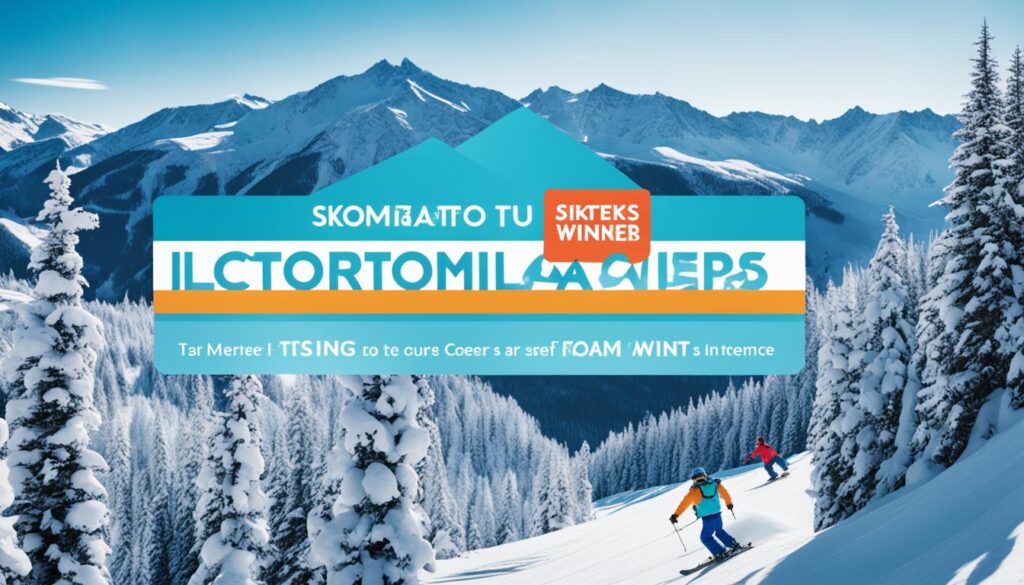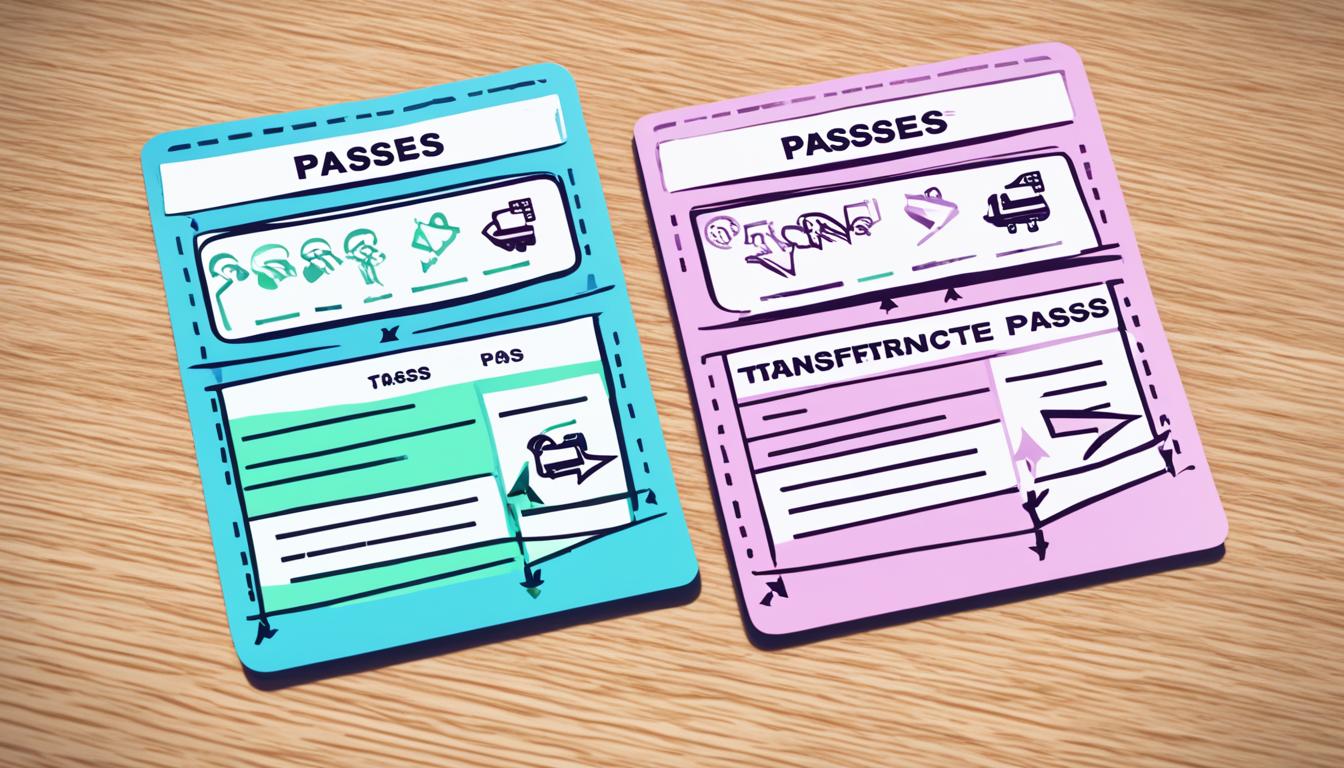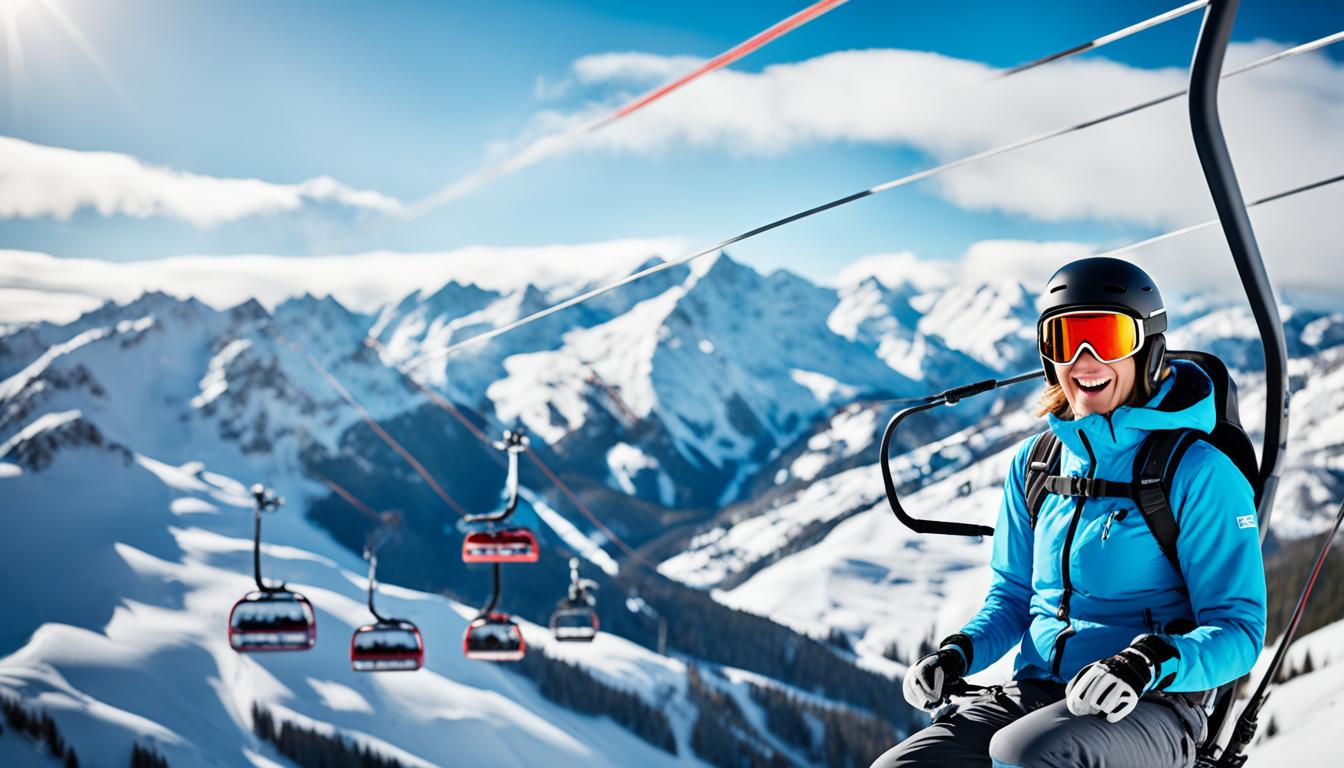Welcome to our guide on lift ticket insurance for your ski trip! When planning your winter getaway, it’s important to consider all aspects of protecting your ski vacation costs. While ski resorts may have their own refund policies, it’s worth exploring additional options to ensure you have the right coverage in case of unexpected events.
Ski trip insurance plans offer a range of benefits, including coverage for trip cancellation or interruption, medical expenses due to accidents, lost or delayed baggage, and equipment protection. However, it’s essential to carefully review the terms and conditions to assess if these options meet your specific needs.
In this article, we’ll discuss the types of ski travel insurance plans available, the cost associated with them, and the existing coverage you may already have. Additionally, we’ll provide key factors to consider when purchasing ski travel insurance and help you make an informed decision to protect your investment in a ski trip.
Key Takeaways:
- Ski trip insurance provides coverage for trip cancellation, medical expenses, lost baggage, and equipment protection.
- Ensure you carefully review the terms and conditions of ski travel insurance plans to see if they meet your specific needs.
- The cost of ski travel insurance can range from a few percentage points to over 10% of the total trip cost.
- Consider any existing coverage you may have through ski resorts, credit cards, or travel agents.
- When deciding whether to purchase ski travel insurance, evaluate your personal risk tolerance, trip cost, health insurance coverage, and cancellation policies.
Types of Ski Travel Insurance Plans
Ski travel insurance plans offer comprehensive coverage for various aspects of your ski trip, ensuring peace of mind and financial protection. These insurance plans typically include:
- Trip Cancellation or Interruption – Covers the non-refundable expenses if you have to cancel or cut short your trip due to unforeseen circumstances like illness, injury, or other covered reasons.
- Medical Expenses – Provides coverage for medical treatment and emergency medical evacuation in case of accidents or injuries during your ski trip.
- Lost or Delayed Baggage – Offers reimbursement for the cost of replacing essential items, such as ski gear and clothing, if your baggage is lost or delayed by the airline.
- Equipment Protection – Protects your valuable ski equipment against loss, theft, or damage. This coverage may also include rental equipment reimbursement if your gear is stolen or damaged.
Understanding your individual circumstances and the specific needs of your ski trip is essential when evaluating the type of ski travel insurance plan that best suits you. Whether you are concerned about potential trip cancellations, unexpected medical expenses, lost baggage, or protecting your valuable equipment, there are insurance plans available to address these concerns.
| Insurance Coverage | Benefits |
|---|---|
| Trip Cancellation or Interruption | Reimbursement for non-refundable trip costs if you have to cancel or cut short your ski vacation. |
| Medical Expenses | Coverage for medical treatment and emergency medical evacuation in case of accidents or injuries during your ski trip. |
| Lost or Delayed Baggage | Reimbursement for the cost of replacing essential items if your baggage is lost or delayed by the airline. |
| Equipment Protection | Protection against loss, theft, or damage to your valuable ski equipment, including rental equipment reimbursement. |
Cost of Ski Travel Insurance
When planning a ski trip, it’s essential to consider all aspects of your budget, including the cost of ski travel insurance. Ski travel insurance can provide financial protection in case of unexpected events, but it does come at an additional expense.
The cost of ski travel insurance typically ranges from a few percentage points to over 10% of the total trip cost. This cost can vary depending on factors such as the duration of your trip, the level of coverage you select, and the insurance provider you choose.
For some travelers, adding the cost of ski travel insurance to their trip budget is financially viable and provides peace of mind. They understand the importance of having coverage in case of accidents, injuries, or trip cancellations. Skiing abilities and experience can also play a role in the decision. Experienced skiers with a good track record of injury-free trips may feel more confident in their skills and choose to forego ski travel insurance to reduce their overall expenses.
However, it’s crucial to keep in mind that even the most skilled skiers can face unexpected challenges on the slopes. Accidents happen, and having insurance can help protect your finances and provide assistance during difficult situations.
Ultimately, the decision to invest in ski travel insurance depends on your ski trip budget, financial situation, skiing abilities, and personal risk tolerance. It’s essential to evaluate the potential risks and weigh them against the cost of insurance to make an informed decision.
In the end, the goal is to ensure that you have a safe and enjoyable ski trip, free from financial worries. Assess your individual circumstances, consider the potential costs of unforeseen events, and determine if ski travel insurance is a financially viable option for you.
Remember, injury-free trips are never guaranteed, and having the right coverage can provide you with peace of mind and help protect your investment.
Existing Coverage for Ski Trips
When it comes to planning a ski trip, it’s essential to consider the various types of coverage available to protect your investment. While ski travel insurance plans offer comprehensive protection, there are other sources of coverage you may already have in place.
Many ski resorts provide built-in protection for their visitors. This coverage often includes limited protection for on-slope accidents and injuries, giving you peace of mind while enjoying your winter adventure. However, it’s important to note that the extent of this coverage varies, so it’s crucial to review the ski resort’s policies and limitations before relying solely on these benefits.
Another potential source of coverage is through your credit card benefits. Some credit cards offer travel and trip cancellation benefits that may extend to your ski trips. These benefits can provide financial protection in case of unexpected trip cancellations or delays, ensuring that you don’t lose your investment.
If you booked your ski trip through a travel agent or tour operator, your package might include certain protection as well. These agents often offer travel insurance options that can cover trip cancellations, medical emergencies, and lost or delayed baggage. It’s advisable to review the terms and conditions of this coverage to understand the extent of protection provided.
Furthermore, it’s crucial to consider the existing coverage you may have through your health insurance plan. While it may provide coverage for medical emergencies, it’s essential to check if it extends to ski-related accidents and injuries. Additionally, verify if the coverage extends to the location of your ski trip, especially if you’re planning an international adventure.
Ultimately, it’s essential to carefully assess the terms and conditions of these built-in protections to ensure they meet your specific needs. Remember that ski travel insurance plans offer comprehensive coverage for trip cancellation, medical expenses, lost baggage, and equipment protection. Therefore, it’s crucial to compare and evaluate the benefits, limits, and exclusions of these existing coverages with ski travel insurance plans before making a final decision.
Benefits of Existing Coverage for Ski Trips:
- Built-in protection at ski resorts for limited on-slope accidents
- Credit card benefits that may include travel and trip cancellation coverage
- Protection provided by travel agents or tour operators for booked packages
- Potential coverage through existing health insurance plan
Considerations for Existing Coverage:
- Review the terms and conditions of built-in protection at ski resorts
- Understand the limits and exclusions of credit card benefits
- Assess the extent of protection provided by travel agents or tour operators
- Check if your health insurance plan covers ski-related accidents and injuries
By carefully evaluating all available options, you can ensure that you have the necessary coverage to protect your ski trip investment and enjoy your winter getaway with peace of mind.
| Existing Coverage | Benefits | Considerations |
|---|---|---|
| Built-in protection at ski resorts | Limited coverage for on-slope accidents | Review terms and conditions |
| Credit card benefits | Travel and trip cancellation coverage | Check limits and exclusions |
| Travel agent coverage | Protection for booked packages | Assess extent of coverage |
| Existing health insurance | Potential coverage for medical emergencies | Verify ski-related accident coverage |
Factors to Consider When Purchasing Ski Travel Insurance
When deciding whether to purchase ski travel insurance, there are several important factors to take into account. Evaluating these factors will help you make an informed decision that best suits your needs and provides adequate protection for your upcoming ski trip.
Personal Risk Tolerance
Consider your personal risk tolerance when deciding on ski travel insurance. Skiing and snowboarding carry inherent risks, and your comfort level with these risks will play a role in determining the level of coverage you require. If you prefer a safety net that provides financial protection in case of accidents or unforeseen events, ski travel insurance is a wise choice.
Trip Cost
Take into account the overall cost of your trip when considering insurance options. Ski travel insurance typically ranges from a few percentage points to over 10% of the total trip cost. Analyze your budget and determine whether the additional expense is worthwhile in relation to the protection it provides.
Health Insurance Coverage
Check your existing health insurance coverage to understand the extent of protection offered during your ski trip. Some policies may not include coverage for skiing-related accidents, so it’s important to fill any gaps with a specialized ski travel insurance plan that includes medical expenses.
Destination
The location of your ski trip is another key factor to consider. Research the availability and accessibility of medical facilities at your destination. If you’re traveling to a remote area or a foreign country where medical services may be limited, having ski travel insurance with comprehensive coverage for medical emergencies is essential.
Equipment Coverage
Assess the coverage provided for your ski equipment. Damage, loss, or theft of your gear can be costly. Look for ski travel insurance that offers equipment coverage to ensure you’re financially protected in case of any unfortunate incidents.
Cancellation Policies
Review the cancellation policies of your travel and accommodation bookings. Unforeseen circumstances can arise that may force you to cancel or change your plans. Ski travel insurance can help reimburse non-refundable costs, providing financial peace of mind.

Comparison of Ski Travel Insurance Plans
| Insurance Provider | Coverage Options | Cost (% of Trip Cost) | Medical Expenses | Equipment Protection | Trip Cancellation/Interruption |
|---|---|---|---|---|---|
| Company A | Basic, Comprehensive, Deluxe | 7% | Up to $50,000 | Yes | Yes |
| Company B | Standard, Enhanced | 5% | Up to $100,000 | Yes | Yes |
| Company C | Basic, Premium | 8% | Up to $75,000 | No | Yes |
Making the Decision to Insure Your Ski Trip
Deciding whether to insure your ski trip is a personal choice that depends on various factors. These factors include your peace of mind, individual circumstances, skiing experience, and existing protection from resorts or other entities.
When it comes to peace of mind, ski trip insurance can provide you with a sense of security, knowing that you are financially protected in case of unforeseen circumstances. It can offer reassurance that your investment in the ski trip is safeguarded, allowing you to focus on enjoying your time on the slopes.
Your individual circumstances also play a significant role in your insurance decision. Consider factors such as your overall health, any pre-existing medical conditions, and the potential risks associated with the destination you plan to visit. If you have a history of skiing accidents or injuries, it may be wise to prioritize ski trip insurance to mitigate potential financial burdens.
Experienced skiers may feel confident in their abilities and have a good track record of injury-free trips. In such cases, the need for ski trip insurance might be less essential. However, it’s important to note that accidents can happen to anyone, regardless of their experience level. Evaluating your personal risk tolerance and considering the potential costs associated with medical emergencies or trip cancellations can help inform your decision.
Before making a final decision, it’s crucial to assess any existing protections you may already have. Some ski resorts offer limited coverage for on-slope accidents, and certain credit cards provide travel and trip cancellation benefits. If you booked your trip through a travel agent or tour operator, your package might include certain protection as well. However, it’s important to carefully review the terms and conditions of these protections to ensure they meet your specific needs.
In conclusion, deciding whether to insure your ski trip requires careful consideration of your peace of mind, individual circumstances, skiing experience, and existing protection. Assess your specific needs and the level of risk you are willing to accept before making your insurance decision. Remember, the goal is to achieve peace of mind and protect yourself financially in case the unexpected occurs.
Conclusion
When it comes to protecting your investment in a ski trip, the decision of whether or not to purchase ski trip insurance requires careful consideration. Factors such as individual circumstances, risk tolerance, and existing protection should be evaluated to make an informed decision.
For some, the additional cost of ski trip insurance is outweighed by the peace of mind it provides. Skiing and snowboarding can be exhilarating but come with inherent risks. With ski trip insurance, you can have financial protection against unforeseen events such as trip cancellation, medical expenses, lost baggage, and equipment damage.
On the other hand, some skiers and snowboarders may feel comfortable relying on the built-in coverage provided by ski resorts or their own experience. They may believe that their risk tolerance is low, their skiing abilities are strong, and they have a good track record of injury-free trips. In such cases, ski trip insurance may not be necessary.
It is crucial to review all available options and carefully examine the terms and conditions of ski resorts and credit cards that offer protection. Compare the coverage and benefits provided by ski travel insurance plans to determine if they meet your specific needs.
Ultimately, whether you choose to purchase ski trip insurance or not, the goal is to protect your investment and have a worry-free ski vacation. Each skier’s circumstances are unique, and the decision-making process should align with individual preferences and priorities.
| Pros of Ski Trip Insurance | Cons of Ski Trip Insurance |
|---|---|
|
|
Quote:
“Insurance is like a safety net for your ski trip investment. It provides you with financial protection and peace of mind, allowing you to fully enjoy your time on the slopes without worrying about unforeseen circumstances.” – Ski Vacation Experts

When it comes to deciding whether to purchase ski trip insurance, carefully evaluate your personal circumstances, consider your risk tolerance, and weigh the benefits and costs. By making an informed decision, you can ensure that your investment in a ski trip is protected and enjoy your time on the slopes to the fullest.
Additional Resources
If you’re in the process of ski trip planning and looking for the best ski resorts in North America, we’ve got you covered. Our 2023 North American ski resort rankings provide valuable insights and information to help you make informed decisions and ensure a memorable and enjoyable ski vacation.
Whether you’re an experienced skier or a beginner, our rankings offer a comprehensive overview of the top ski resorts in North America. From the popular destinations like Aspen and Vail to hidden gems like Jackson Hole and Park City, we’ve curated a list that caters to every skiing preference.
Discover the ski resorts with the best slopes, breathtaking scenery, top-notch amenities, and exciting après-ski activities. With our rankings, you’ll be able to plan your ski trip with confidence, knowing that you’ve chosen a resort that meets your expectations.
FAQ
Is lift ticket insurance worth it?
Lift ticket insurance can provide valuable coverage for protecting your ski vacation costs. It typically offers benefits such as trip cancellation or interruption, medical expenses due to accidents, lost or delayed baggage, and equipment protection. However, whether it’s worth it depends on your individual circumstances and risk tolerance.
What does ski trip insurance cover?
Ski trip insurance plans typically provide coverage for trip cancellation or interruption, medical expenses resulting from accidents on the slopes, lost or delayed baggage, and equipment protection. It is important to carefully review the terms and conditions of the specific plan to determine the extent of coverage.
How much does ski travel insurance cost?
The cost of ski travel insurance can vary depending on factors such as the total trip cost and the level of coverage required. It typically ranges from a few percentage points to over 10% of the total trip cost. It is recommended to obtain quotes from different insurance providers to compare prices and coverage options.
Does my ski resort offer any coverage for accidents?
Many ski resorts offer built-in protection for their visitors, which may include limited coverage for on-slope accidents. However, the extent of coverage and specific terms and conditions vary by resort. It is important to review the ski resort’s refund policy and any included protections before relying solely on their coverage.
Does my credit card provide any benefits for ski trips?
Some credit cards offer travel and trip cancellation benefits that may extend to ski trips. These benefits can include coverage for trip cancellation, lost or delayed baggage, and medical expenses. It is advisable to check with your credit card provider to understand the specific benefits and any limitations or exclusions that may apply.
Does booking through a travel agent or tour operator provide any coverage?
If you booked your ski trip through a travel agent or tour operator, your package might include certain travel protections. These protections can vary by provider and may include coverage for trip cancellation or interruption, medical expenses, and lost or delayed baggage. It is essential to review the terms and conditions of the package to determine the extent of coverage.
What factors should I consider when purchasing ski travel insurance?
When deciding whether to purchase ski travel insurance, consider factors such as your personal risk tolerance, the cost of your trip, your existing health insurance coverage, the location and accessibility of medical facilities at your destination, the coverage for your equipment, and the cancellation policies of your travel and accommodation bookings.
How do I make the decision to insure my ski trip?
The decision to insure your ski trip is personal and depends on factors such as your peace of mind, individual circumstances, skiing experience, and existing protection from resorts or other entities. Assess your specific needs, the level of risk you are willing to accept, and weigh the potential financial impact of unforeseen events against the cost of insurance.
Where can I find additional resources for planning a ski trip?
For more information on planning a ski trip and finding the best ski resorts in North America, check out our 2023 North American ski resort rankings. These resources can help you make informed decisions and ensure a memorable and enjoyable ski vacation.




